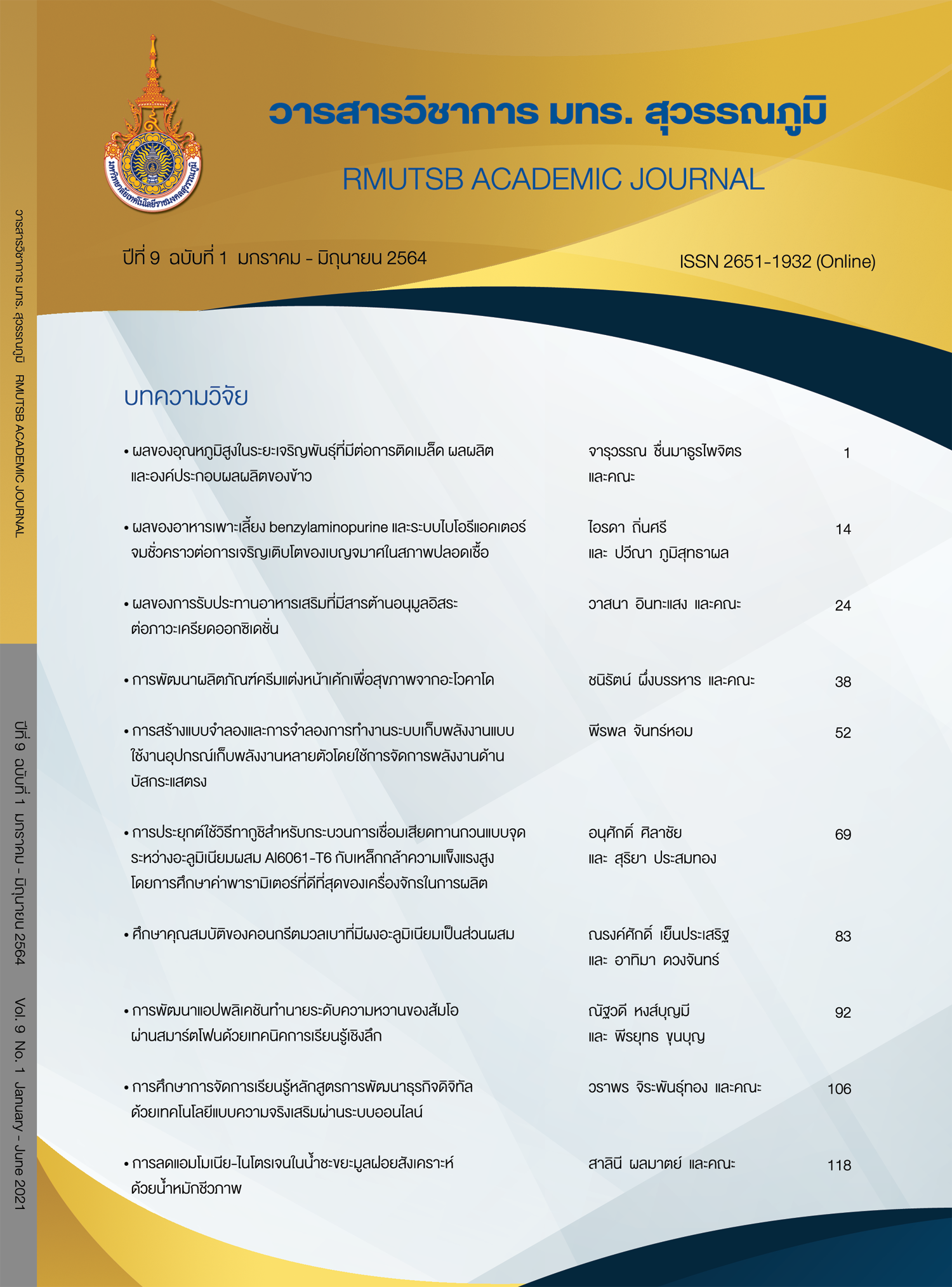Effect of high temperature at reproductive stage on seed set, yield and yield components of rice
Main Article Content
Abstract
Global warming relating to temperature increasing results in a decrease of seed set and yield of rice. High temperature negatively affects to reduce pollen viability and germination of rice. Each rice variety is different tolerance to high temperature. Therefore, the objective was to study the effect of high temperature at a reproductive stage on seed set, yield, and yield components of rice. The pot experiment was arranged in split-plot in CRD with 4 replications. The main plot was field temperature condition 30-35 °C, and the high temperature controlled-greenhouse at 40-45 °C. The sub-plots were five rice varieties; Chainat 1, Pathum Thani 1, RD41, Sin Lek, and M9962. All rice varieties were planted in pots under the field condition. At the reproductive stage (R2), each variety were tested in the greenhouse under high temperature until harvest (R9) and compared with field condition. The results showed that high temperature significantly decreased the panicle length, panicle weight, yield/plant, seed set, filled seed weight/panicle, total seed weight/panicle, and 1,000 seed weight. At high temperature, Chainat 1 had higher yield/plant 21.80 g than RD41 and Pathum Thani 1. For seed set evaluation, all rive varieties under field condition had seed set higher than 80%, excepting Sin Lek. Whereas, M9962 had seed set of 73.20% followed by Chainat 1 had 60.40% seed set at high temperature. While, Sin Lek, Pathum Thani 1 and RD41 gave seed set of 2.20, 33.10, and 45.30%, respectively.
Article Details
Published manuscript are the rights of their original owners and RMUTSB Academic Journal. The manuscript content belongs to the authors' idea, it is not the opinion of the journal's committee and not the responsibility of Rajamangala University of Technology Suvarnabhumi
References
Ceccarelli, S., Grando, S., Maatougui, M., Michael, M., Slash, M., Haghparast, R., Rahmanian, M., Taheri, A., Al- Yassin, A., Benbelkacem, A., Labdi, M., Mimoun, H., & Nachit, M. (2010). Plant breeding and climate changes. The Journal of Agricultural Science, 148(6), 627-637.
Cheabu, S., Moung-ngam, P., Arikit , A., Vanavichit, A., & Malumpong, C. (2018). Effects of heat stress at vegetative and reproductive stages on spikelet fertility. Rice Science, 25(4), 218-226.
IRRI. (2013). Standard evaluation system for rice (5th ed.). Philiippins: International Rice Research Institute.
Madan, P., Jagadish, S. V. K., Craufurd, P. Q., Fitzgerald, M., Lafage, T., & Wheeler, T. R. (2012). Effect of elevated CO2 and high temperature on seed set and grain quality of rice. Journal of Experimental Botany, 63(10), 3843-3852.
Matsui, T., Omasa, K., & Horie, T. (2000). High temperatures at flowering inhibit swelling of pollen grains, a driving force for thecae dehiscence in rice (Oryza sativa L.). Plant Production Science, 3, 430-434.
Mittler, R., & Blumwald, E. (2010). Genetic engineering for modern agriculture: Challenges and perspectives. Annual Review of Plant Biology, 61, 443-462.
Oh-e, I., Saitoh, K., & Kuroda, T. (2007). Effects of high temperature on growth, yield and dry-matter production of rice grown in the paddy field. Plant Production Science, 10, 412-422.
Pansrithong, M., Romkaew, J., Malumpong, C., Thongket, P., & Thongjoo, C. (2019). Seed set and quality of rice as affected by high temperature at reproductive stage. Proceedings of the 16th National Seed Conference 2019 (pp.125-139). Lopburi: Thepsatri Rajabhat University. (in Thai)
Pompech, D., Chai-arree, W., Moung-ngam, P., & Malumpong, C. (2017). The evaluation of high temperature tolerance at reproductive stage in non-photo sensitive rice cultivars. Khon Kaen Agriculture Journal, 45, 1024-1031. (in Thai)
Prasad, P. V. V., Boote, K. J., Allen, L. H., Sheehy, J. E., & Thomas, J. M. G. (2006). Species, ecotype and cultivar difference in spikelet fertility and harvest index of rice in response to high temperature stress. Field Crops Research, 95, 398-411.
R Core Team. (2020). R: A language and environment for statistical computing. Vienna, Austria: R Foundation for Statistical Computing.
Satake, T., & Yoshida, S. (1978). High temperature induces sterility in indica rice at flowering. Japanese Journal of Crop Science, 47, 6-17.
Sato, K. (1973). The development of rice grains under controlled environment. III. Germinability of seeds ripened under different environmental conditions. Tohoku Journal of Agricultural Research, 24, 14-21.
Shah, F., Huang, J. L., Cui, K. H., Nie, L. M., Shah, T., Chen, C., & Wang, K. (2011). Impact of high-temperature stress on rice plant and its traits related to tolerance. The Journal of Agricultural Science, 149(5), 545-556.
Thakumme, C. (2002). Effect of high temperatures in booting stages and pollination and yield composition of second-eastern rice in the Northeast (Master‘s thesis). Khon Kaen University, Khon Kaen. (in Thai)
Tian, X.-H., Matsui, T., Li, S. H., & Lin, J. C. (2007). High temperature stress on rice anthesis: Research progress and prospects. The Journal of Applied Ecology, 18, 2632-2636.
Wongchalee, P., Arikit, S., Ruanjaichon, V., Vannavichit, A., & Malumpong, C. (2015). The impact of high temperature on seed set at reproductive stages between heat-tolerant vs non-tolerant lines and the segregation analysis of seed set trait in the F2 population. Proceeding of 53rd Kasetsart University (pp. 17-24). Bangkok: Kasetsart University. (in Thai)
Xie, X. J., Li, B. B., Li, Y. X., & Shen, S. H. (2009). High temperature harm at flowering in Yangtze River basin in recent 55 years. Jiangsu Journal of Agricultural Sciences, 25, 28-32.
Yoshida, S. (1973). Effects of temperature on growth of the rice plant (Oryza sativa L.) in a controlled environment. Soil Science and Plant Nutrition, 19, 299-310.
Yoshida, S. (1981). Fundamental of rice crop science. Los Banos, Philippines: International Rice Research Institute.
Zhang, C. X., Li, G. Y., Chen, T. T., Feng, B. H., Fu, W. M., Yan, J. X., Islam, M. R., Jin, Q. Y., Tao, L. X., & Fu, G. F. (2018). Heat stress induces spikelet sterility in rice at anthesis through inhibition of pollen tube elongation interfering with auxin homeostasis in pollinated pistils. Rice, 11, 14.


